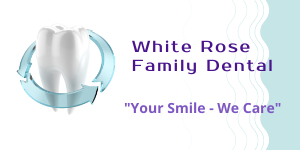Having a great smile is about more than just keeping your teeth clean and free of cavities. Your gums are an extremely important part of your oral health. With these tips from a dentist in York, PA, you will be well-equipped to prevent gum disease.
Gum disease refers to a condition called periodontal disease. If left untreated, periodontitis can lead to bone damage and even tooth loss. In its early stages, periodontal disease is called gingivitis. Both conditions – periodontal disease and gingivitis – are called gum disease. According to the Centers for Disease Control and Prevention (CDC), more than 40% of adults over 30 are affected by gum disease. By the age of 65, that number climbs to more than 70%.
While dentists can help with your overall dental health, lifestyle changes like quitting tobacco products and eating better will make a significant difference. Here are a few tips to prevent gum disease:
1. Prioritize Oral Hygiene
Excellent oral hygiene is crucial to keeping your gums healthy. Brushing and flossing are necessary to rid your mouth of the bacteria that can lead to gum disease. Brush twice daily (morning and night) with a soft-bristled brush and floss every day. Flossing cleans in between the teeth, where bits of food and bacteria like to hide. If you notice bleeding when you floss or brush, that could be a sign of the early stages of periodontal disease. Luckily, gingivitis can easily be treated. However, it’s imperative to take immediate action to reverse the early stages of gum disease and prevent it from becoming a more serious issue. In addition to brushing and flossing daily, use an alcohol-free mouthwash. Using mouthwash can help reduce plaque and may also remove any remaining food particles that brushing and flossing missed.
2. Maintain A Healthy Diet
Eating for oral health means more than just avoiding sugary drinks and sweet, sticky foods. Gums actually require certain vitamins and minerals. Be sure to eat plenty of fruits and vegetables. Vitamin C is especially helpful as it helps to strengthen gums and fight off infections. Foods such as kale, oranges, and broccoli should be eaten frequently. Calcium-rich foods, such as leafy greens and yogurt, are essential for maintaining strong teeth and gums. And last but not least, drinking plenty of water is also important for gum health. Staying hydrated not only helps wash away food particles and bacteria in between brushings, but it can also help avoid dry mouth, which can lead to bad breath and other oral issues. Oral health is a reflection of overall health, so it makes sense that a well-balanced diet rich in essential vitamins and minerals would help alleviate inflammation and produce healthy gums.
3. Don’t Use Tobacco
Tips for healthy gums are the same tips that contribute to overall health. Tobacco use causes numerous issues, including increasing the tartar in your mouth. If you smoke, vape, or chew tobacco, stop right away. It’s possible to prevent or even reverse periodontal disease by quitting tobacco use.
4. Reduce Stress
It may surprise you to learn that chronic stress can negatively affect your oral health. Chronic stress leads to a weakened immune system that can’t respond to unhealthy bacteria as effectively as it should. Also, some people grind or clench their jaw when they are stressed. This is a condition called bruxism, and it can lead to damaged gums and teeth. Getting fitted for a mouth guard to wear at night (which is when most people grind their teeth) can help to protect your gums and teeth. In addition, take steps to deal with chronic stress.
5. Schedule Regular Dental Visits
Even if you are doing all the right things, you may still be at risk for gum disease. That is one of the reasons it is important to come to regularly scheduled dental appointments. Our professional staff is trained to spot the early signs of periodontal disease so that you can stop gum disease in its tracks. Coming in for regular cleanings and examinations not only protects you from worsening symptoms but it is a vital part of healthy dental hygiene.
Keep your gums healthy, and call today to schedule your appointment!
Periodontitis can cause painful and unsightly gums and teeth; however, with the right at-home care and frequent visits to your dentist, you can help prevent gum disease. Don’t delay. The early stages of periodontitis can be unnoticeable in many patients until the condition progresses to an advanced stage. Inflamed, painful, bleeding gums, bad breath, and loose teeth are all indications of periodontitis. Call our office today to book an appointment.
If you are looking for a dentist in York, PA, call us today at (717) 822-0272 or click here to schedule your appointment.
